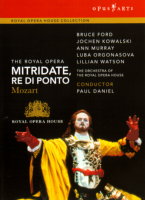
Fortunes in Love
Mozart's 'Mitridate' -
enjoyed by
ROBERT ANDERSON'... marvellous singing throughout ...'
|

|
For twenty-five years Mithridates VI of Pontus led Rome the merriest of dances in one of those classic East-West confrontations that continue to plague the world. Based in Turkey and the Crimea, he threatened to make the Black Sea a Mare Ponticum, and it took all the skill of Roman generals such as Sulla, Lucullus, and Pompey eventually to put him down. His body was so inured to the poisons with which he attempted to commit suicide that he had to be finished off by another's hand. And here he is, by courtesy of Racine and Cigna-Santi, magnanimous to all and sundry in the best tradition of opera seria with his dying breath.
The French Revolution was a distant cloud twenty years off when Mozart at fourteen wrote this opera for Milan. Court circles could still tie themselves in as many amorous knots as they pleased to while away a pleasant evening in whatever historical setting they chose. So Mithridates is less concerned with Rome (it has to despatch him when all are reconciled) than with the fortunes in love of himself and his two sons. It is misunderstanding that keeps the work afloat and gives the teenage Mozart every opportunity to agonise with his characters; and already his wind instruments have the secret of worming into any heart.
At the start Mithridates (Bruce Ford) has circulated the report that he is dead. So the work opens against the background of an obelisk dutifully erected in his memory. The Aspasia of Luba Orgonasova had been his betrothed, but now she is apparently the plaything of his two sons.
Watch and listen -- No 1 Aria (Aspasia) (Act 1) (DVD1 chapter 3, 10:08-11:29)
© 1993 Covent Garden Pioneer FSP Ltd / Royal Opera House Covent Garden Ltd
As Sifare, Ann Murray supports the Greeks of good old times against ruthless Rome, and now betrays his feelings for the deserted Aspasia.
Watch and listen -- No 2 Aria (Sifare) (Act 1) (DVD1 chapter 4, 18:46-20:31)
© 1993 Covent Garden Pioneer FSP Ltd / Royal Opera House Covent Garden Ltd
Whether the costumes of Paul Brown are typical of a Pontic court is quite beyond me. The spread-arm gestures, though, are all that opera seria is likely to get.
Jochen Kowalski's alto Farnace is the elder son, historically slaughtered by his father, but operatically forgiven for a flirtation with Rome and unduly forceful attempt to make Aspasia his own. At the outset he is all villain.
Watch and listen -- No 6 Aria (Farnace) (Act 1) (DVD1 chapter 7, 35:26-36:47)
© 1993 Covent Garden Pioneer FSP Ltd / Royal Opera House Covent Garden Ltd
Indeed his eyebrows are initially as unstable as his character is menacing. But everyone is brought up short by the arrival of Mithridates himself, accompanied by an outlandish cohort of warrior supporters with prominent red tongues who can only be Hyperboreans, about whom the ancient world knew nothing.
Watch and listen -- No 7 March (Act 1) (DVD1 chapter 8, 43:36-44:16)
© 1993 Covent Garden Pioneer FSP Ltd / Royal Opera House Covent Garden Ltd
The most level-headed character in the opera is the Ismene of Lillian Watson, got up to resemble how a peahen should look if God had not run out of ideas after inventing the peacock. Her unrequited love for Farnace persists until it gets its ultimate reward. And it is she who prevents Mithridates from doing away with both his sons. For the moment, though, he is appropriately moved at being back in the Crimea, and is about to kiss, in the manner of John Paul II, a mound of sand above the prompter's box.
Watch and listen -- No 10 Aria (Mitridate) (Act 1) (DVD1 chapter 11, 63:12-64:10)
© 1993 Covent Garden Pioneer FSP Ltd / Royal Opera House Covent Garden Ltd
Act 2 displays the young Mozart at his most intense, with wondrous horn obbligato and oboes only reluctantly resolving their dissonances. And the characters are at such sixes and sevens that Aspasia and Sifare, cornered by Mithridates, consider death the only release from their woes.
Watch and listen -- No 18 Duet (Sifare, Aspasia) (Act 2) (DVD1 chapter 19, 125:43-126:49)
© 1993 Covent Garden Pioneer FSP Ltd / Royal Opera House Covent Garden Ltd
It is then the turn of Farnace to face the ultimate penalty. A Roman tribune is shown bestriding a vast world globe, but Farnace decides to fire the Roman ships and return to the love of Ismene. Thus the dying Mithridates can bless his sons and their brides, while they can descant cheerily on the disadvantages of empire.
Watch and listen -- No 25 Quintet (Act 3) (DVD1 chapter 27, 173:40-174:02)
© 1993 Covent Garden Pioneer FSP Ltd / Royal Opera House Covent Garden Ltd
There has been marvellous singing throughout this 1993 performance, and Paul Daniel's taut direction demonstrates conclusively that Mozart is a genius at any age.
Copyright © 13 July 2008
Robert Anderson, Cairo, Egypt

Mitridate, Re di Ponto
OA R3105 D NTSC DVD9 4:3 All regions Dolby digital NEW RELEASE 177' 1993 Covent Garden Pioneer FSP Ltd / Royal Opera House Covent Garden Ltd, 2008 Opus Arte
Bruce Ford, Mitridate; Ann Murray, Sifare; Jochen Kowalski, Farnace; Luba Orgonasova, Aspasia; Lillian Watson, Ismene; Jacquelyn Fugelle, Arbate; Justin Lavender, Marzio; Paul Wynne Griffiths, harpsichord; Christopher Vanderspar, cello; The Orchestra of the Royal Opera House; Bradley Creswick, concert master; Paul Daniel, conductor; Graham Vick, stage director; Paul Brown, sets and costumes; Nick Chelton, lighting; Ron Howell, choreography and movement
Wolfgang Amadeus Mozart (1756-1791): Mitridate, Re di Ponto, opera seria in three acts, libretto by Vittorio Amadeo Cigna-Santi after Jean Racine, translated by Giuseppe Parini. Recorded live at the Royal Opera House, Covent Garden, London on 20 and 22 October 1993 |
BUY THIS DVD ONLINE
|

